Ukraine’s civil society remains of paramount importance in winning the hearts and minds of its citizens as well as establishing a sound rule of law system. These aspects will empower the Eastern European country to gain international credibility in its hopes to join the EU. Central European Affairs Magazine spoke to Oleksandra Matviychuk, head of the board at The Center for Civil Liberties, an organization promoting human rights in the OSCE region.
Author: Jared Feldschreiber
As a stalwart human rights defender, and a recipient of the US Mission’s Freedom Award, Oleksandra Matviychuk, who serves as the head of the board at The Center for Civil Liberties (CCL), is devoted to positive political change. Matviychuk’s focused mission remains to develop legislative changes, as her organization in Ukraine aims to exercise public oversight over law enforcement agencies and the judiciary. CCL is also committed to conducting educational activities for young people, as well as implementing international programs.
Matviychuk was among a handful of expert speakers taking part during sessions at the OSCE/ODIHR conference held at the Palace of Culture and Science in Warsaw in mid-October. In the two-day affair, the event was composed largely of various human rights defenders, diplomats, and academics of all stripes — all of whom were honoring thirty years of civil society programs, which were in part, enacted by the OSCE in hopes of continuing to “strengthen democratic institutions and the rule of law, and increase respect for human rights.”
CEA Magazine EXCLUSIVELY spoke with Oleksandra Matviychuk on the sidelines after her panel discussion. In this conversation, Matviychuk delved into how civil society groups, like CCL, continue to improve and inform ordinary Ukrainians’ lives with its brave and practical implementation of change reforms. Matviychuk also discussed how best to comprehend, confront and tackle institutional corruption effectively. She also weighed in on the populist approaches of Ukrainian President Volodymyr Zelensky.
CEA: What is The Center for Civil Liberties’ main emphasis? Please give an overview of largely the work you do.
Oleksandra Matviychuk: We are focused on [various cases] on behalf of detained people. This may include [greater awareness and working to seek justice on behalf of] political prisoners in Crimea, and with hostages in the Donbas region. I mentioned during the OSCE/ ODIHR panel the work our civil society volunteer group, OZON does, as well. It is composed of people who provide citizen oversight of the bad actions by police and with the court system. Our goal is not just to improve the methods used by police but to encourage the behavior of state institutions. They should serve the people.
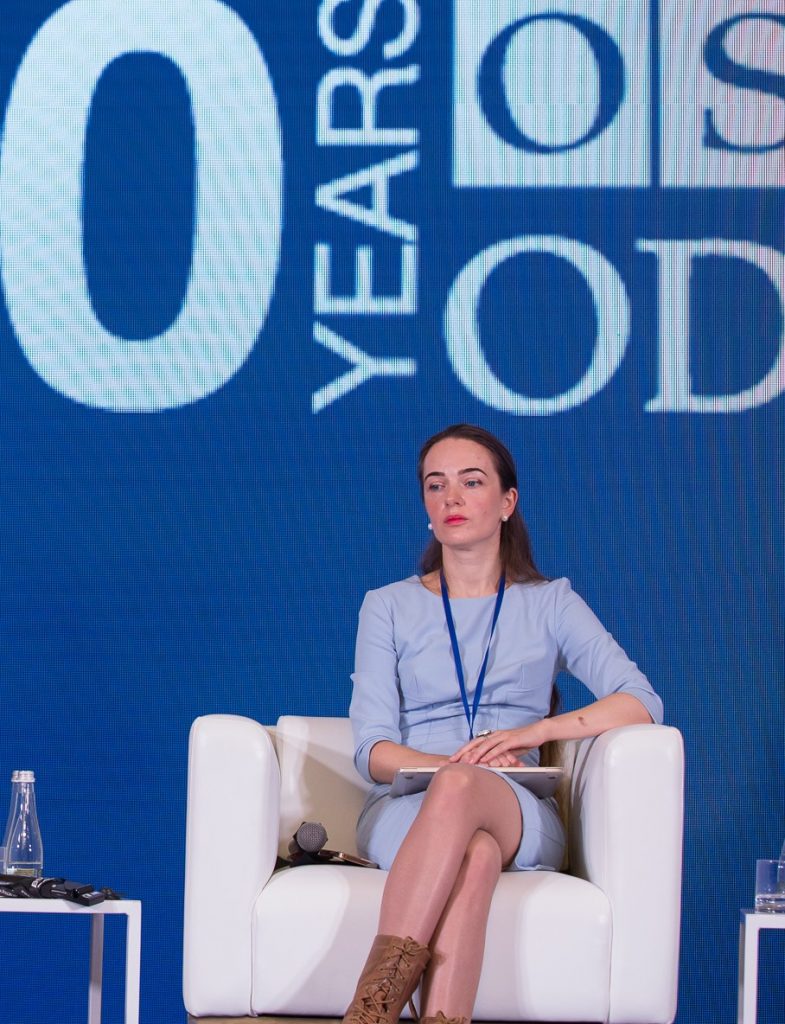
Photo credit: OSCE
We also work to improve education and the environment. It is very important to work for values within societies. Our work also deals with international solidarity. We are an active member among different international coalitions, networks, and international projects. Everything we face in Ukraine is a reflection of global trends for the entire region, so that’s why we have to work not just within our national borders.
Corruption a major issue
CEA: As for internal issues within Ukraine, there has been a solid push to fight corruption within the courts for the last few years. How can there be a more sound justice system?
OM: Corruption is a big problem in Ukraine but we have to understand the roots of corruption. Corruption in Ukraine is institutionalized, which means that we have not only corrupt politicians, but it’s a system of relations.
When you ask the question to most people on the street, “what’s the main problem in Ukraine?”
Most would answer, “corruption.”
“But do you personally provide a bribe to have your children in kindergarten find a space? So, why would you pay a bribe?”
“It’s not corruption. We are just trying to solve our small affairs,” would be the typical reply.
This is the mentality [of many people]. People pay money not just to pay a fine. They do it because there are limited spaces in kindergarten, and these people pay bribes to get their child a guaranteed spot, for example.
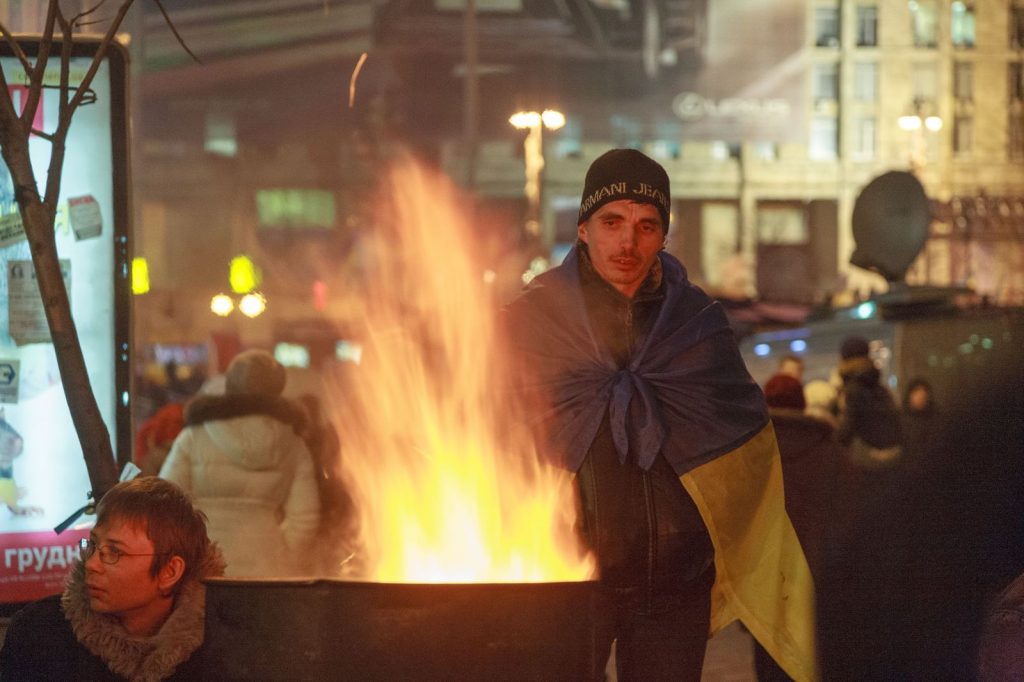
Photo credit: Maksym Bilousov
CEA: So you’re implying that the general idea of tackling corruption in Ukraine is still misguided?
OM: If you want to fight corruption within Ukraine, it’s not enough to establish an anti-corruption court and only prosecute top officials. If the population thinks it’s OK to pay money or to receive money illegally, it means that an anti-corruption court will work for ages. If we want to fight corruption in Ukraine as an institutionalized system, we have to replace this corruption relation with another kind of relation.
I am a fan of the idea of building a rule of law system. So anti-corruption court organization campaigns are focused on fighting and exposing guilty people. Human rights organizations are focused on how to make a system where not just [the powerful] must follow the rule of law.
CEA: Right — because these are the tenets of any real democracy. You’re highlighting the fact that these mechanisms should’ve already been in place?
OM: I will try to answer your question in this way. Ukraine is a nation in transition. And unfortunately for a nation in transition, corruption is one feature. But this doesn’t mean Ukraine will not succeed in building a sustainable democracy. It means that we have a problem, and corruption is one of the problems.
Ukraine, however, is one of the most transparent countries in the region regarding the opening of different database assets.
CEA: Database assets of what?
OM: After the Revolution of Dignity, the civil society promoted anti-corruption legislation, which made it obligatory to show a lot of information that had been hidden before. And now you have no access to such information, for instance, in Russia. But you can easily google it. Well, not easily, but you can now find this information in Ukraine.
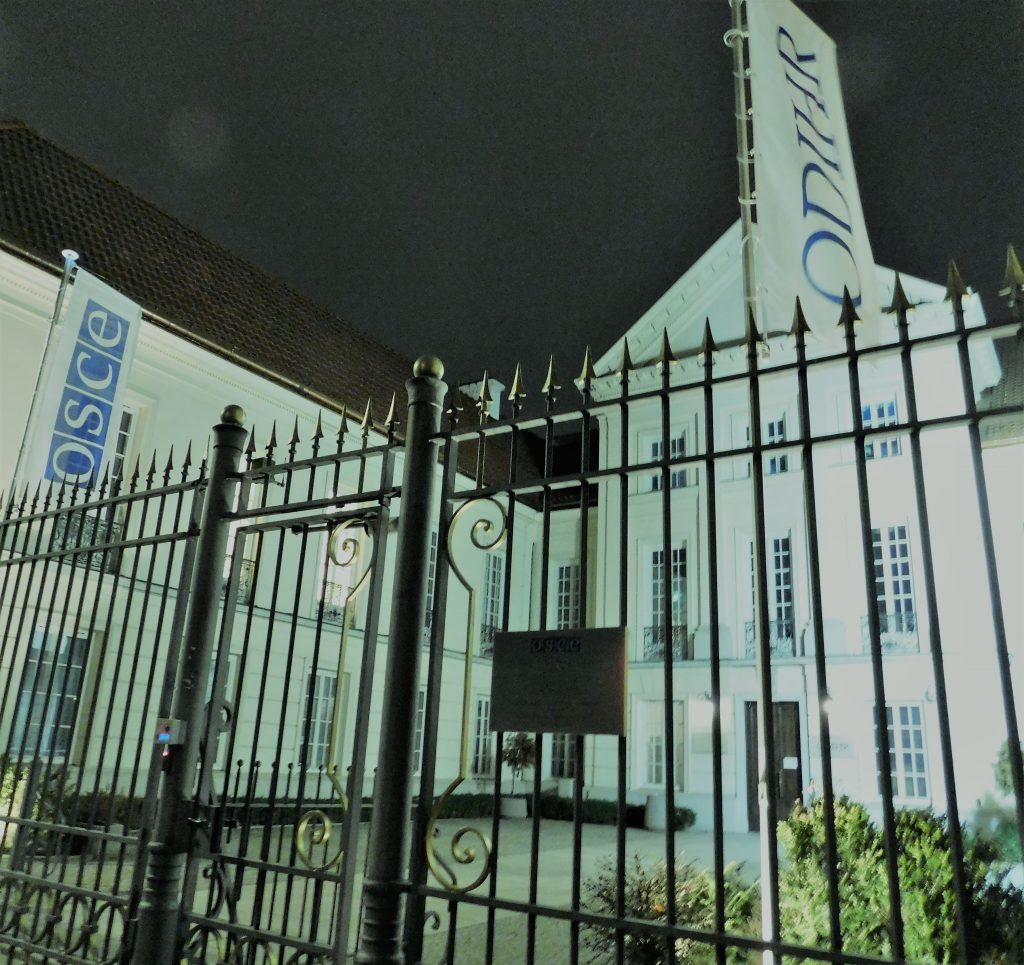
Photo credit: Jared Feldschreiber
CEA: That was done by the pressure from whom?
OM: The civil society and the international community. And here’s why I mentioned before that the roots of corruption in Ukraine are very important to understand. The problem is not only that we have to go after corrupt officials. It’s a symptom of another problem. It’s why I said it’s like a system of relations. And if you want to change the situation, we need not only to fight with politically corrupt officials — which is important — but to build a rule of law system with an independent judiciary.
What is most important is to inspire people to believe that this system – a rule of law system – is better than a corruption-style system.
A long time ago, people believed that papers were essential. If you gave these papers, you could receive… essentially money. They invented money. If you did not have money, you couldn’t eat, and you couldn’t dress. Everyone knows that money has value, so you can exchange products and other goods for it. Now in Ukraine, and other countries that are transnational democracies, people have the belief that human rights also have value.
CEA: So let’s look at things from a security standpoint. Many in Western Europe and America are sympathetic to Ukraine in its fight against Russia. I’m wondering if you feel optimistic. Well, I’m sure in your line of work you must be.
OM: Yes.
Ukraine and the civilizational battle
CEA: Dual loyalties, though, remain a big problem in Ukraine. During the takeover of Crimea, for instance, Vladimir Putin sought to manipulate the hearts of many Russian-speaking citizens there. So how can this security battle be won in Ukraine if some are not loyal to their nation?
OM: I agree that there is a security aspect, but for me, it’s a civilizational battle. It’s a battle for a model of running societies. Eight years ago, Ukraine decided to choose the democratic path in governing its society. We had to defend this democratic choice during the Revolution of Dignity, and we continue to pay a high price for it.
In our war with Russia, we are now defending the right to have a choice.
CEA: But didn’t the purpose of the Revolution of Dignity change over its many weeks? Weren’t many upset with exiled President Viktor Yanukovych for turning East and then the demonstrations evolved to being more about institutional change?
OM: OK, maybe I don’t understand you correctly. When Euromaidan started, the reason was that Yanukovych stopped the process of EU integration, and for many people, it meant that we would return to Russia. Yanukovych did not say that we would return to Russia, but if he stopped this path toward EU integration, for us Ukrainians, it meant that he chose Russia’s worldview.
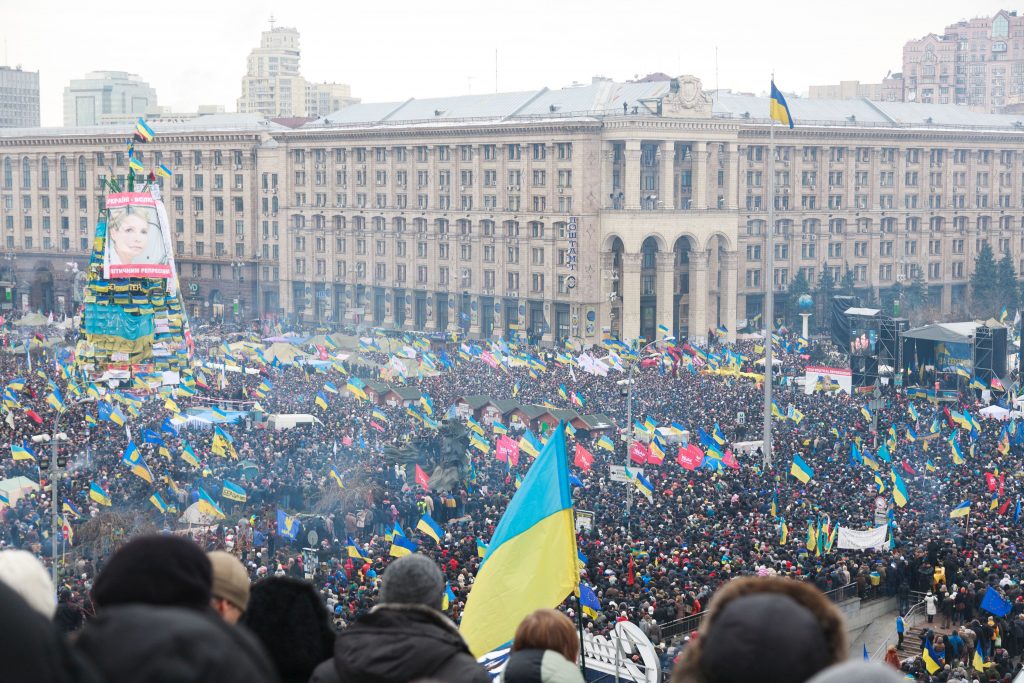
Photo credit: Maksym Bilousov
CEA: He individually chose it…
OM: Yes — individually.
But when there was a brutal dispersal of a peaceful student demonstration, we had a sociological rebuke, and people were asked, “why did you come on the 1st of December to Maidan?”
By then, half a million were on the streets — it was huge. I never expected so many people, frankly speaking.
And if you asked people on the street, “why are you fighting for democracy in this Revolution of Dignity?”
They’d never respond with, “because I would like to join some geopolitical union.” They don’t understand what the EU is. For them, it’s something very abstract, and something distant.
Instead, a typical response would be, “we don’t want police to beat peaceful student demonstrators. We want to have an independent court. We want our government to not be corrupt. We want to live in our society and have equal rules for everybody where our rights are protected.”
It’s all about human dignity. It’s about European values. So it was a civilizational choice, not a political choice. It was not meant to join some geopolitical structure. This was stated in sociological reviews, which were done during the Revolution of Dignity period.
CEA: So the connection with economics and human rights is a straight line? They are correlated, and one is intrinsically linked with the other?
OM: Ukrainian history shows very well we are a nation that has had artificial hunger imposed by Soviet power. The most famous and cruel example was the Holodomor famine in which several million people died. For Ukrainians, it’s very obvious that, yes, food matters. We need food. But if you have no human rights to say you are hungry, you will never have this food. Rights are very linked to the economy. Maybe that’s why all of the sociological reviews have indicated Ukrainians say that our most important value is freedom.
We have a lot of problems with human rights. I can tell you — we have a lot of problems. I criticize Ukrainian authorities because it is my focus. But I am very proud that eight years ago, the Ukrainian people chose the democratic way with its high standards of human rights, and we are slowly moving in the right direction.
Zelensky on the populist path
CEA: Even for all of these aspirational hopes, it is still curious that Volodymyr Zelensky won the presidency by such a landslide in the 2019 elections.
OM: But it was very predictable.
CEA: Was it?
OM: It’s a populist moment. He chose the populist path.
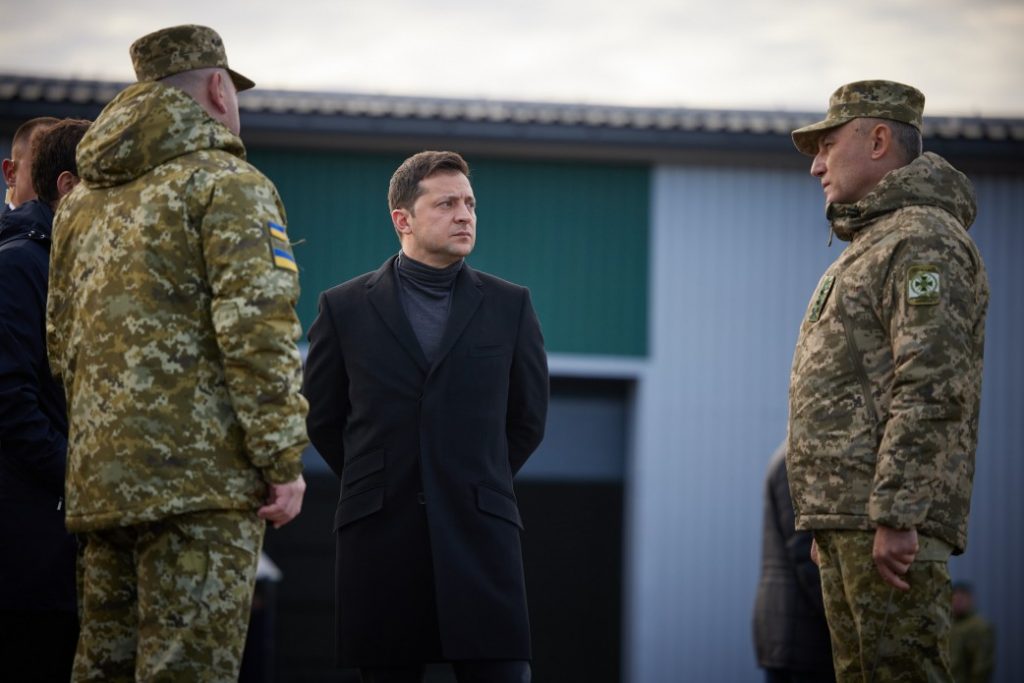
Photo credit: Official website of the President of Ukraine
CEA: But did he even want to win?
OM: Oh I don’t know, frankly speaking. People voted for such people — and not just in Ukraine. We see the populist model in well-developed democracies. Populist candidates often say, “I’m an ordinary person, and I don’t belong to the corrupt elite.”
And this works.
CEA: You believe Zelensky is a populist? You don’t think he comes across as an appealing fresh face? He has an inherent likability because of his successful acting career, no?
OM: I think that Zelensky has an opportunity to develop, and he has a chance [to succeed]. But when he started his political career, his idea of solving problems was very populist. I think his problem was that he had no clear idea of how to govern the country. His message was very simple.
CEA: But he wanted to win, right?
OM: (laughs). I don’t know. Now he will say that he always had a strong intent to be elected, but I don’t know. He still has a rather big reach. By the end of his presidency, he will have no excuse if he will not complete (his mandate) because he has everything.
CEA: So is it true that Zelensky is rooting out corruption, even with his links to [oligarch] Igor Kolomoisky, for example?
OM: I’m not an anti-corruption activist but as I see it, Zelensky was not only an actor but a successful show-businessman. He cooperated with Kolomoisky because Kolomoisky is the owner of one of the most popular TV channels. So I don’t know whether Zelensky has corrupt links but this can be seen as cooperation as a show-businessman and an owner of a TV channel.
This question has to be asked to my colleagues who work on such corruption investigations. I will say that the Ukrainian president did announce a “war on oligarchs.”
CEA: Including Kolomoisky…
OM: Including Kolomoisky. And who knows what will happen. Political success in Ukraine means you’ve appeared on TV channels. And TV channels are owned by oligarchs. If he starts a war on oligarchs sooner or later, we will see whether these oligarchs running these channels may start to criticize him and this will damage his ratings.
Then there will be a “war on oligarchs.”
Cover photo credit: Maksym Bilousov
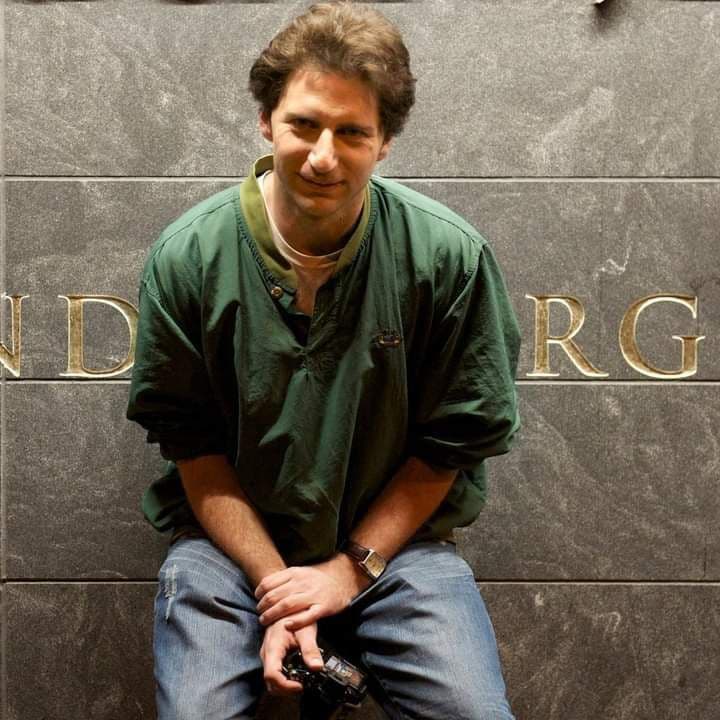
Jared Feldschreiber is a freelance reporter and contributor to Central European Affairs Magazine. He is based in Warsaw, Poland, and often chronicles literary figures, filmmakers, and dissidents in nascent democracies. Reckless Abandon, his novella, is available worldwide.
Twitter: @jmfeldschreiber
Photo credit: Ilan Sherman



